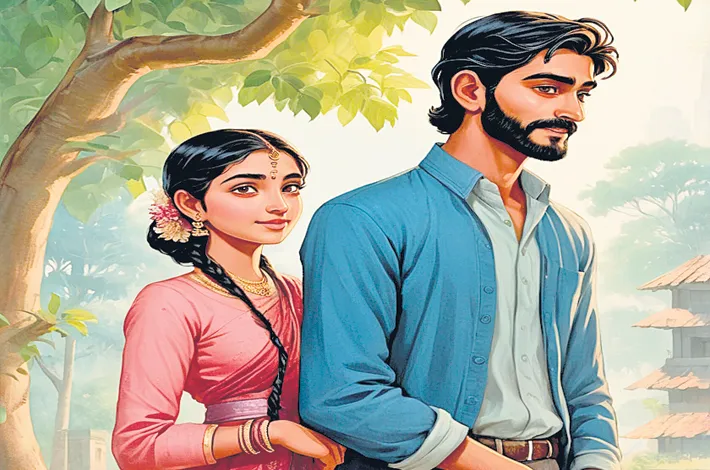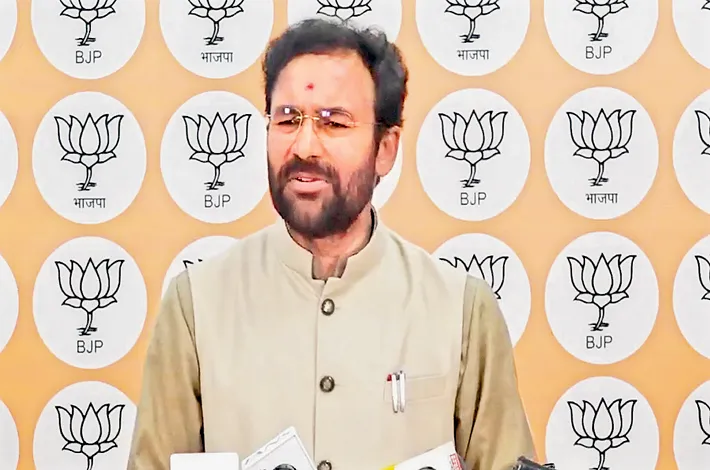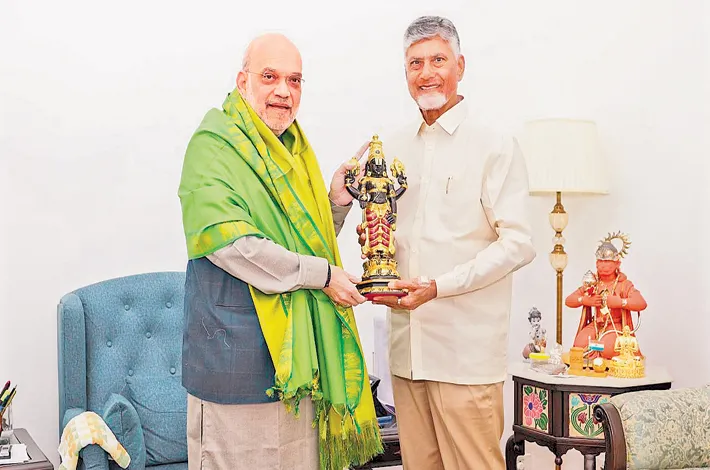A Gift of Time
02-05-2025 12:00:00 AM

One evening, after finding her playing hopscotch with street children instead of preparing dinner, Anoop’s patience frayed. “You’re my wife, Minoo. You can’t act like a child forever.” Her face crumpled, but she said nothing, retreating to their room. The silence between them grew heavy, a chasm neither knew how to bridge
The monsoon rains had painted the small town of Shantinagar in shades of green, where the air carried the scent of wet earth and blooming jasmine. Anoop, a young law student from Calcutta, stepped off the train, his suitcase heavy with books and a heart heavier with duty.
His widowed mother, Shanti, had summoned him home, her letter crisp with purpose: she had chosen a bride for him, a girl named Minoo from their neighborhood. Anoop, with his city-bred sensibilities, felt a knot of apprehension. Marriage was a distant thought, but Shanti’s quiet strength was not to be questioned.
Minoo was unlike any girl Anoop had met. She was nineteen, with eyes that sparkled like the river under moonlight, and a laugh that danced through the village lanes. When he first saw her at a friend’s wedding, she was chasing children through a mango orchard, her dupatta trailing like a kite’s tail.
She was a whirlwind of joy, unburdened by the weight of propriety. Anoop, reserved and studious, found her chaos strangely magnetic. Over cups of cardamom tea at Shanti’s insistence, they spoke—awkwardly at first. Minoo’s stories were of climbing trees and stealing guavas, while Anoop spoke of law cases and city lights. Yet, in her presence, he felt a lightness he hadn’t known he craved.
Their marriage was arranged swiftly, as was the custom. The ceremony was simple, held under a canopy of marigolds, with the village humming in celebration. Minoo, draped in red, looked radiant but restless, her fingers fidgeting with her bangles. Anoop, in his sherwani, stole glances at her, wondering if she felt the same stirrings he did. He wanted to know her, not just as a wife, but as the girl who ran barefoot through orchards.
But Minoo was a riddle. In their new home in Calcutta, she was a child in a woman’s body. She’d leave dishes unwashed to chase sparrows on the balcony or spend hours braiding flowers into her hair instead of helping with chores. Anoop, torn between his studies and her unpredictability, grew frustrated. “Minoo, this is our home now,” he’d say, his voice gentle but firm. She’d pout, her eyes flashing. “I didn’t ask to leave Shantinagar.” Her words stung, revealing a truth: she wasn’t ready for this life, and perhaps, neither was he.
One evening, after finding her playing hopscotch with street children instead of preparing dinner, Anoop’s patience frayed. “You’re my wife, Minoo. You can’t act like a child forever.” Her face crumpled, but she said nothing, retreating to their room. The silence between them grew heavy, a chasm neither knew how to bridge. When Anoop’s exams loomed, he made a decision that broke his heart. “You should stay with your mother for a while,” he told her, his voice barely above a whisper. Minoo nodded, her eyes distant, and returned to Shantinagar.
Months passed. Anoop buried himself in his books, but Minoo’s absence was a quiet ache. He missed her laughter, her impulsiveness, even her maddening disregard for routine. Letters from Shanti hinted at change—Minoo was helping with village chores, teaching children to read, her spirit still bright but tempered. Anoop wondered if she missed him, if she regretted their parting as he did.
One autumn, driven by a longing he could no longer ignore, Anoop returned to Shantinagar. The village was ablaze with marigolds for a festival, and there, amidst the crowd, was Minoo. She was different—her movements graceful, her smile carrying a quiet wisdom. She was organizing a play with the children, her voice steady yet warm. When their eyes met, time seemed to pause. “Anoop,” she said softly, her voice a melody he’d forgotten.
They walked to the riverbank, where the water mirrored the dusk sky. “I was a child,” Minoo began, her gaze on the horizon. “I didn’t understand what it meant to be with you. But being away… it made me see.” She turned to him, her eyes glistening. “I missed you, Anoop. Not just the idea of you, but you—your quiet smiles, your stories of justice.”
Anoop’s heart swelled. “I pushed you too hard,” he admitted. “I wanted you to fit into my world, but I didn’t try to understand yours.” He reached for her hand, her fingers warm against his. “I love you, Minoo—not the wife I thought you should be, but the girl who makes the world brighter.” She smiled, a tear slipping down her cheek. “Can we start again?” she asked, her voice trembling with hope. Anoop nodded, pulling her close. The river flowed beside them, carrying away the weight of their past mistakes.
They returned to Calcutta together, not as strangers bound by duty, but as partners learning to weave their worlds. Minoo still chased sparrows, but she also sat with Anoop, listening to his dreams. He, in turn, joined her in the village during holidays, racing children through orchards. Their love grew not from perfection but from patience, a gift they gave each other—time to grow, to understand, to love. In Shantinagar, years later, Shanti watched them, now with a child of their own, and smiled. “Upahaar,” she whispered, naming the gift of their love, a treasure born from the heart’s quiet journey.








